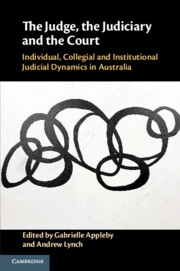 The Judge, the Judiciary and the Court
The Judge, the Judiciary and the Court from Part II - Debates and Challenges to the Judicial Role
Published online by Cambridge University Press: 04 May 2021
The emotional dimensions of judicial work are investigated from various perspectives and methods. A focus of this emerging research is the idea that emotion is not entirely spontaneous, uncontrolled or irrational. Emotions can be resources in everyday judicial work, as well as needing regulation. This chapter investigates judicial experience and display of emotion, including judicial officers’ observations, anticipation or perception of the emotion of others, and the practices judicial officers adopt to manage their own emotions and those of others. Close examination of two segments from interviews with judicial officers using a sociological framework draws out the layered dimensions of judicial emotion work. Although this work occurs within institutional and organisational constraints, in particular the dominant cultural script of judicial dispassion, this analysis demonstrates multiple ways emotion is a resource to achieve practical, normative and ethical goals and confirms the intertwining of emotion work with judicial work.
To save this book to your Kindle, first ensure no-reply@cambridge.org is added to your Approved Personal Document E-mail List under your Personal Document Settings on the Manage Your Content and Devices page of your Amazon account. Then enter the ‘name’ part of your Kindle email address below. Find out more about saving to your Kindle.
Note you can select to save to either the @free.kindle.com or @kindle.com variations. ‘@free.kindle.com’ emails are free but can only be saved to your device when it is connected to wi-fi. ‘@kindle.com’ emails can be delivered even when you are not connected to wi-fi, but note that service fees apply.
Find out more about the Kindle Personal Document Service.
To save content items to your account, please confirm that you agree to abide by our usage policies. If this is the first time you use this feature, you will be asked to authorise Cambridge Core to connect with your account. Find out more about saving content to Dropbox.
To save content items to your account, please confirm that you agree to abide by our usage policies. If this is the first time you use this feature, you will be asked to authorise Cambridge Core to connect with your account. Find out more about saving content to Google Drive.